Module 2 Amazing things Unit 4 Numbers课件
文档属性
| 名称 | Module 2 Amazing things Unit 4 Numbers课件 |

|
|
| 格式 | zip | ||
| 文件大小 | 1.4MB | ||
| 资源类型 | 教案 | ||
| 版本资源 | 牛津上海版(试用本) | ||
| 科目 | 英语 | ||
| 更新时间 | 2017-09-09 15:56:19 | ||
图片预览


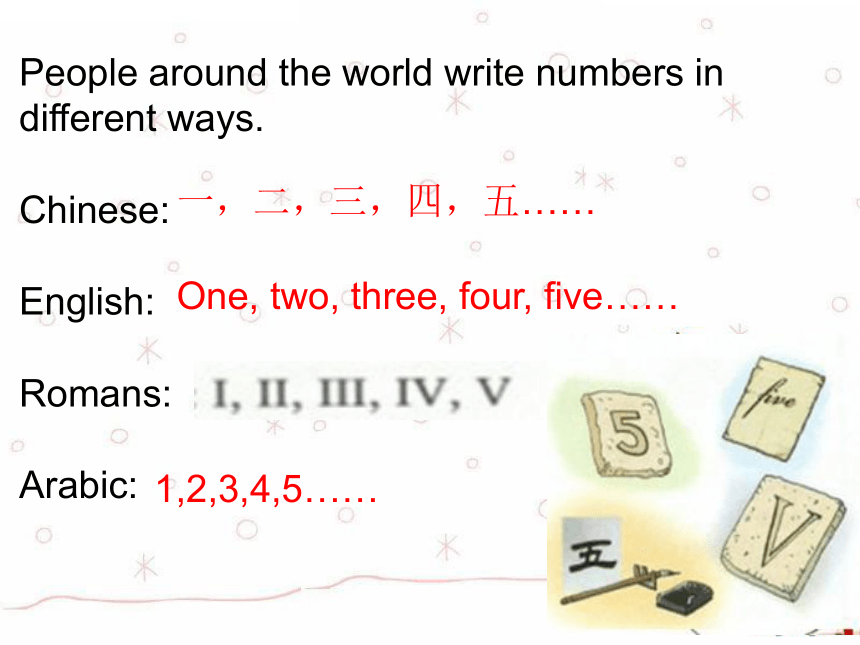

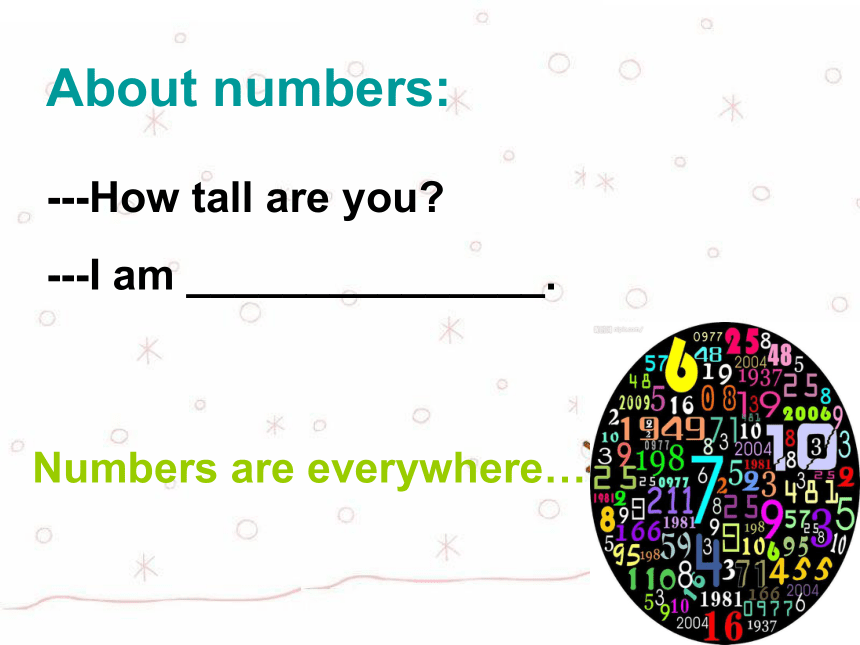

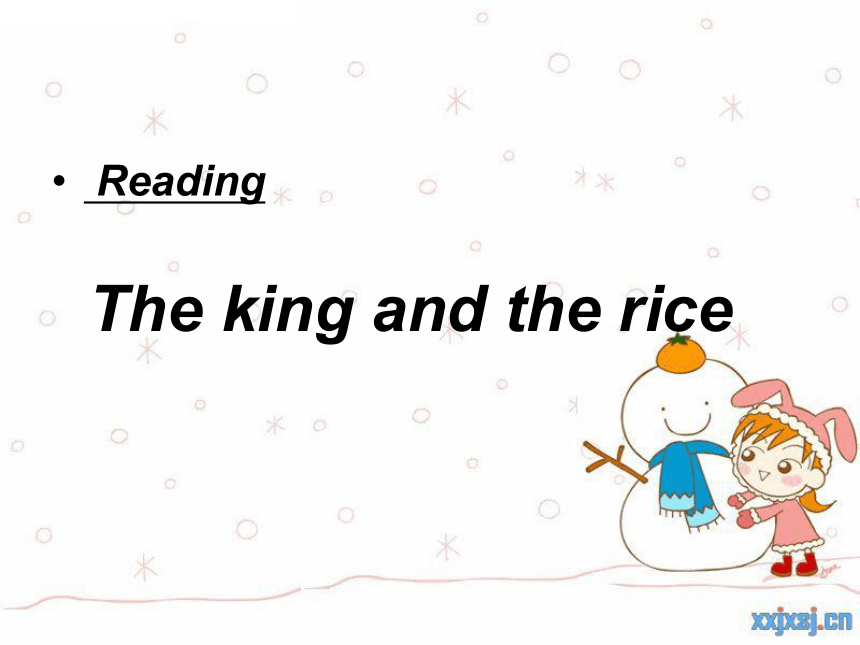
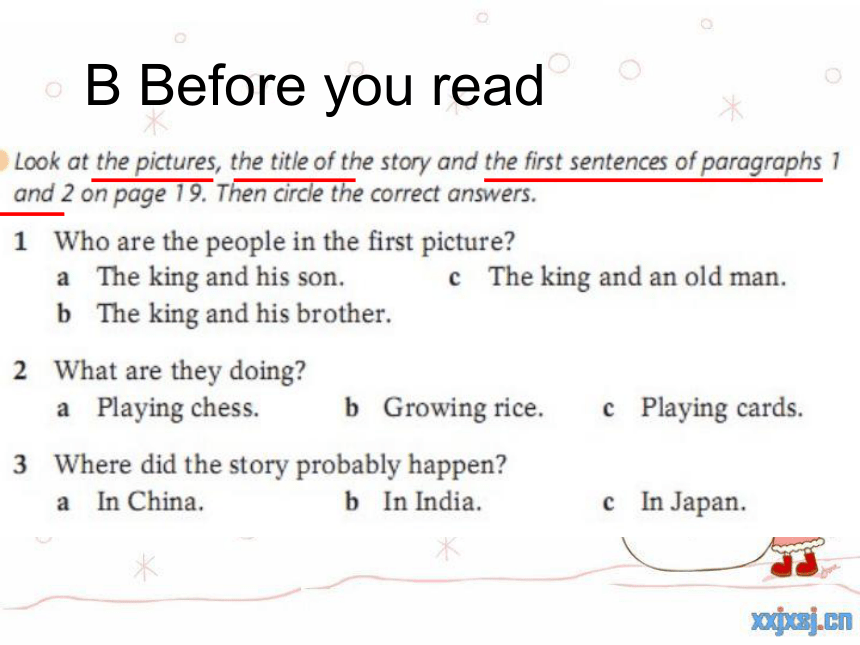
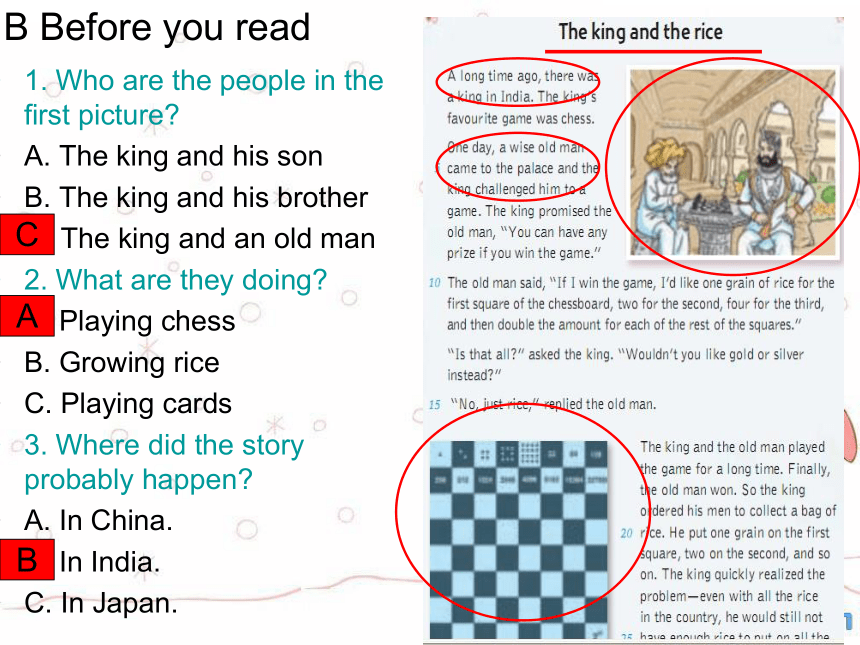
文档简介
课件26张PPT。 Unit4 NumbersWhat do you know about numbers?People around the world write numbers in different ways.
Chinese:
English:
Romans:
Arabic:一,二,三,四,五……One, two, three, four, five……1,2,3,4,5……About numbers:---When is your birthday?
---It is on_______________.About numbers:---How tall are you?
---I am _______________.Numbers are everywhere…A What do you know about---?12310:1052617.83.90The king and the rice ReadingB Before you readB Before you read1. Who are the people in the first picture?
A. The king and his son
B. The king and his brother
C. The king and an old man
2. What are they doing?
A. Playing chess
B. Growing rice
C. Playing cards
3. Where did the story probably happen?
A. In China.
B. In India.
C. In Japan.CABFirst-Readingin India wise old man the wise old man any prize a long time The old man enough riceSecond-ReadingThe king’s favourite game was chess.“Is that all?”“Wouldn’t you like gold or silver instead?”The king quickly realized the problem-even with all the rice in the country, he would still not have enough rice to put on all the squares!ExercisewiseprizepromisedoublerealizedRetell the storyWhere
Who
What: the beginning
the middle
the endLanguage points1. A long time ago, there was a king in India。很久以前,印度有位国王
a long time ago.意为“很久以前”;
there be 结构中,谓语动词“就近原则”:There were two dogs behind me。
India :印度,位于亚洲南部的国家。
Indian adj.印度的,印第安人的;
n. 印度人,复数Indians。 2. One day, a wise old man came to the palace and the king challenged him to a game.
challenge,动词,
搭配challenge sb. to sth意为“向某人挑战……”;
名词,意为“挑战”,
如:Every challenge is an opportunity 3.The king promised the old man, “You can have any prize if you win the game.”
Promise: v. 许诺;承诺 promise sb. sth意为“承诺某人某事物”;
另可作n,如:make a promise “做出承诺”。
Prize: 奖赏;奖品;可数名词,多指在各类竞赛竞争中所获得的奖励 翻译:4.“If I win the game, I’d like one grain of rice for the first square of the chessboard, two for the second, four for the third, and then double the amount for each of the rest of the squares. ”
如果我赢了,我想要在棋盘的第一个方格中放1颗谷粒,第二个方格放2颗谷粒,第三个方格放4颗谷粒,依次类推,每个方格的谷粒数目是前一个的两倍。 grain n. 谷粒 可数n,尤指小麦、玉米和水稻。
常有搭配:a grain of…一粒…如: a grain of wheat
chessboard n. 国际象棋棋盘
chessboard是由chess和board合成的名词,叫“合成词”;
double v. (使)加倍
double 动词,如:double the salary “加倍工资”;形容词,意为“两倍的;双重的”如:double standard “双重标准”。
amount n. 数量;数额
an amount of…“许多…”后跟不可数名词
如:an amount of homework “许多作业”。
the amount of…“…的数量”后加不可数名词
rest n. 剩余部分
rest,名词,剩余部分;the rest of…“剩余的…” 5. “Wouldn’t you like gold or silver instead?”. 你反而不想要金子银子吗
(1) gold 金子;黄金 ,不可数名词,也可作形容词,意为“含金的;金色的” 。
(2) instead,副词,放在句末。
instead of“(是)…而不是…”后跟名词,动名词 6. So the king ordered his men to collect a bag of rice.
(1)order sb. to do sth.命令某人去做某事。
(2)collect这里指“去取”,另还表示“收集,收藏”名词:collection
(3)a bag of rice “一袋稻米”; rice不可数;
a bag of pears. Two bags of rice7. He put one grain on the first square, two on the second, and so on.
他把1颗谷粒放在第一个方格上,2颗谷粒放在第二个方格上,依次类推。
and so on“依次类推”;另还有“等等”之意。8. The king quickly realized the problem—even with all the rice in the country, he would still not have enough rice to put on all the squares. 国王很快就意识到问题—即使用上全国的稻米,他也没足够的稻米放上所有的方格。
(1) quickly 为副词修饰realize。
(2) with 介词,在这里意为“用”
(3) enough
修饰n.时,放n.前,如enough money;
修饰adj&adv时,放adj&adv后,如:fast enough。Exercise Book BinstructioncheckamountinsteadcopiedaccidentHomework:
Thank you
Chinese:
English:
Romans:
Arabic:一,二,三,四,五……One, two, three, four, five……1,2,3,4,5……About numbers:---When is your birthday?
---It is on_______________.About numbers:---How tall are you?
---I am _______________.Numbers are everywhere…A What do you know about---?12310:1052617.83.90The king and the rice ReadingB Before you readB Before you read1. Who are the people in the first picture?
A. The king and his son
B. The king and his brother
C. The king and an old man
2. What are they doing?
A. Playing chess
B. Growing rice
C. Playing cards
3. Where did the story probably happen?
A. In China.
B. In India.
C. In Japan.CABFirst-Readingin India wise old man the wise old man any prize a long time The old man enough riceSecond-ReadingThe king’s favourite game was chess.“Is that all?”“Wouldn’t you like gold or silver instead?”The king quickly realized the problem-even with all the rice in the country, he would still not have enough rice to put on all the squares!ExercisewiseprizepromisedoublerealizedRetell the storyWhere
Who
What: the beginning
the middle
the endLanguage points1. A long time ago, there was a king in India。很久以前,印度有位国王
a long time ago.意为“很久以前”;
there be 结构中,谓语动词“就近原则”:There were two dogs behind me。
India :印度,位于亚洲南部的国家。
Indian adj.印度的,印第安人的;
n. 印度人,复数Indians。 2. One day, a wise old man came to the palace and the king challenged him to a game.
challenge,动词,
搭配challenge sb. to sth意为“向某人挑战……”;
名词,意为“挑战”,
如:Every challenge is an opportunity 3.The king promised the old man, “You can have any prize if you win the game.”
Promise: v. 许诺;承诺 promise sb. sth意为“承诺某人某事物”;
另可作n,如:make a promise “做出承诺”。
Prize: 奖赏;奖品;可数名词,多指在各类竞赛竞争中所获得的奖励 翻译:4.“If I win the game, I’d like one grain of rice for the first square of the chessboard, two for the second, four for the third, and then double the amount for each of the rest of the squares. ”
如果我赢了,我想要在棋盘的第一个方格中放1颗谷粒,第二个方格放2颗谷粒,第三个方格放4颗谷粒,依次类推,每个方格的谷粒数目是前一个的两倍。 grain n. 谷粒 可数n,尤指小麦、玉米和水稻。
常有搭配:a grain of…一粒…如: a grain of wheat
chessboard n. 国际象棋棋盘
chessboard是由chess和board合成的名词,叫“合成词”;
double v. (使)加倍
double 动词,如:double the salary “加倍工资”;形容词,意为“两倍的;双重的”如:double standard “双重标准”。
amount n. 数量;数额
an amount of…“许多…”后跟不可数名词
如:an amount of homework “许多作业”。
the amount of…“…的数量”后加不可数名词
rest n. 剩余部分
rest,名词,剩余部分;the rest of…“剩余的…” 5. “Wouldn’t you like gold or silver instead?”. 你反而不想要金子银子吗
(1) gold 金子;黄金 ,不可数名词,也可作形容词,意为“含金的;金色的” 。
(2) instead,副词,放在句末。
instead of“(是)…而不是…”后跟名词,动名词 6. So the king ordered his men to collect a bag of rice.
(1)order sb. to do sth.命令某人去做某事。
(2)collect这里指“去取”,另还表示“收集,收藏”名词:collection
(3)a bag of rice “一袋稻米”; rice不可数;
a bag of pears. Two bags of rice7. He put one grain on the first square, two on the second, and so on.
他把1颗谷粒放在第一个方格上,2颗谷粒放在第二个方格上,依次类推。
and so on“依次类推”;另还有“等等”之意。8. The king quickly realized the problem—even with all the rice in the country, he would still not have enough rice to put on all the squares. 国王很快就意识到问题—即使用上全国的稻米,他也没足够的稻米放上所有的方格。
(1) quickly 为副词修饰realize。
(2) with 介词,在这里意为“用”
(3) enough
修饰n.时,放n.前,如enough money;
修饰adj&adv时,放adj&adv后,如:fast enough。Exercise Book BinstructioncheckamountinsteadcopiedaccidentHomework:
Thank you
